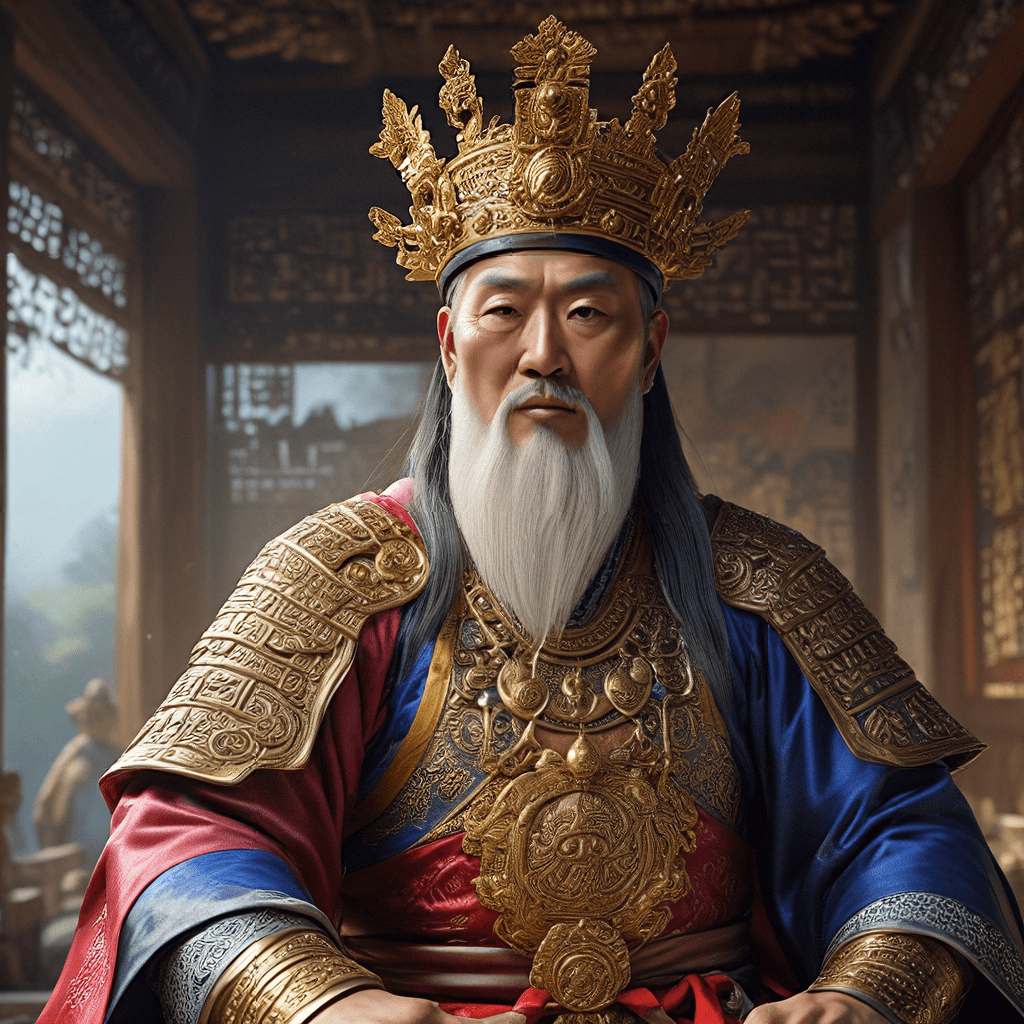King Sinmun: A Legendary Ruler in Korean History
King Sinmun, a pivotal figure in Korean history and mythology, has captured the imagination of generations. His story is a fascinating blend of fact and legend, offering insights into the beliefs and values of ancient Korea. While historical records offer limited information about King Sinmun, it is through the enduring legend that his legacy continues to inspire and intrigue.
The Genesis of the Legend: King Sinmun in Korean Mythology
In Korean mythology, King Sinmun is often associated with the founding of the Silla Dynasty, one of the Three Kingdoms of Korea. Legends portray him as a divine figure, born from a union between a human woman and a dragon king. This divine lineage establishes his legitimacy and reinforces his role as a chosen leader. The story of King Sinmun is a testament to the power of belief and the enduring influence of mythology in shaping national identity.
The Historical Context: King Sinmun in the Silla Dynasty
While the legend of King Sinmun is deeply rooted in myth, there exists a historical context to his story. King Sinmun is said to have been the 13th ruler of the Silla Dynasty, reigning during the 1st century AD. The Silla era, known for its cultural achievements and political stability, witnessed significant growth and expansion. King Sinmun's reign is depicted as a time of peace and prosperity, although specific historical records are scant.
The Tale of the Dragon King’s Daughter: Key Elements of the Legend
The legend of King Sinmun centers around a remarkable tale of love, magic, and divine intervention. It is said that a young woman, the daughter of a powerful dragon king, fell in love with a human man. The dragon king, opposed to this union, imprisoned his daughter in a secluded palace, deep within the ocean. The man, determined to win her love, embarked on a perilous journey, facing mythical creatures and overcoming many obstacles. He eventually found his beloved and together they escaped the dragon king's wrath.
A Divine Union: Sinmun and the Dragon King’s Daughter
The legend goes on to describe the union of the human man and the dragon king's daughter, resulting in the birth of King Sinmun. This divine union symbolizes the fusion of human and divine powers, highlighting Sinmun's unique lineage and the legitimacy of his rule. The blending of earthly and supernatural elements in the story adds to its captivating allure and reflects the complex relationship between humans and the divine in ancient Korean beliefs.
The Birth of the King: Sinmun’s Legacy and the Silla Dynasty
The birth of King Sinmun is often portrayed as a pivotal moment in Korean history. His divine origins granted him exceptional abilities, making him a capable and just ruler. Legends claim that he led the Silla Dynasty to unprecedented prosperity and expanded its territory, solidifying its position as a major force in the Korean peninsula. The legacy of King Sinmun remains deeply ingrained in the cultural consciousness of Korea, with his name often mentioned in folklore and traditional stories.
The Legend as National Identity: Sinmun’s Role in Korean Folklore
King Sinmun's story is not just a captivating tale; it's a cornerstone of Korean national identity. The legend reinforces the belief in a divine lineage for the Silla Dynasty, solidifying its legitimacy and highlighting the dynasty's significance in Korean history. Folklore often depicts Sinmun as a righteous and benevolent ruler, upholding values of justice, prosperity, and unity. These values resonate with Koreans today, reminding them of their shared heritage and fostering a sense of national pride. The enduring popularity of Sinmun's legend across centuries signifies its deep-rooted place in Korean folklore.
Theological Interpretations: Sinmun and the Concept of the Divine
The legend of King Sinmun offers fascinating insights into ancient Korean beliefs about the divine. The union of a human woman with a dragon king, a powerful creature often associated with water and nature, suggests a connection between the human realm and the supernatural. This union suggests that the divine is not separate from humanity but can intervene directly, shaping human destiny. Moreover, Sinmun's birth from this union implies the potential for divinity within humanity, highlighting the sacred nature of life itself. Sinmun's legacy reflects the complex relationship between humanity and the divine in Korean beliefs.
Historical Accuracy: Investigating the Reality Behind the Legend
While the legend of King Sinmun is deeply intertwined with Korean folklore, there is limited historical evidence to support its accuracy. The specific details of his life and reign are mostly shrouded in myth. Historical records from the Silla period mention a King Sinmun, but they do not elaborate on the fantastical elements of the legend. Scholars speculate that the legend might have been embellished over time, adding mythical elements to enhance his stature as a legendary ruler. While the historical accuracy of the legend is debated, its cultural significance remains undeniable.
The Enduring Power of the Legend: Sinmun’s Influence on Korean Culture
King Sinmun's legend continues to inspire and influence Korean culture in various ways. It's woven into traditional tales, songs, and art, including beautiful murals and intricate sculptures depicting his mythical adventures. The legend has also inspired numerous literary adaptations, offering interpretations of his story through modern lenses. The unwavering interest in Sinmun's legend speaks to its lasting power and its ability to connect generations through shared folklore.
Modern Reinterpretations: Sinmun’s Legacy in Contemporary Art and Literature
In the 21st century, Sinmun's legend continues to be reimagined in contemporary art and literature. Modern artists have drawn inspiration from the legend's imagery and themes to create thought-provoking works that explore contemporary issues within a historical context. Writers have adapted the legend, adding modern twists and exploring its metaphorical implications for contemporary society. These re-interpretations demonstrate the enduring power of Sinmun's story and its adaptability to new generations.
FAQ
1. What is the significance of King Sinmun's legend in Korean culture?
King Sinmun's legend is deeply ingrained in Korean culture, serving as a foundation for national identity and highlighting the importance of lineage, divine intervention, and just leadership.
2. Is there historical evidence to support the legend of King Sinmun?
Historical records from the Silla period mention a King Sinmun, but they do not elaborate on the fantastical elements of the legend. Scholars believe the legend might have been embellished over time to enhance his stature as a legendary ruler.
3. What are some modern interpretations of King Sinmun's legend?
Modern artists and writers have reinterpreted the legend, exploring themes of lineage, divine intervention, and justice within a contemporary context.
4. How does King Sinmun's legend reflect ancient Korean beliefs?
The legend reflects ancient Korean beliefs about the divine's ability to intervene in human affairs and the connection between the human realm and the supernatural.




